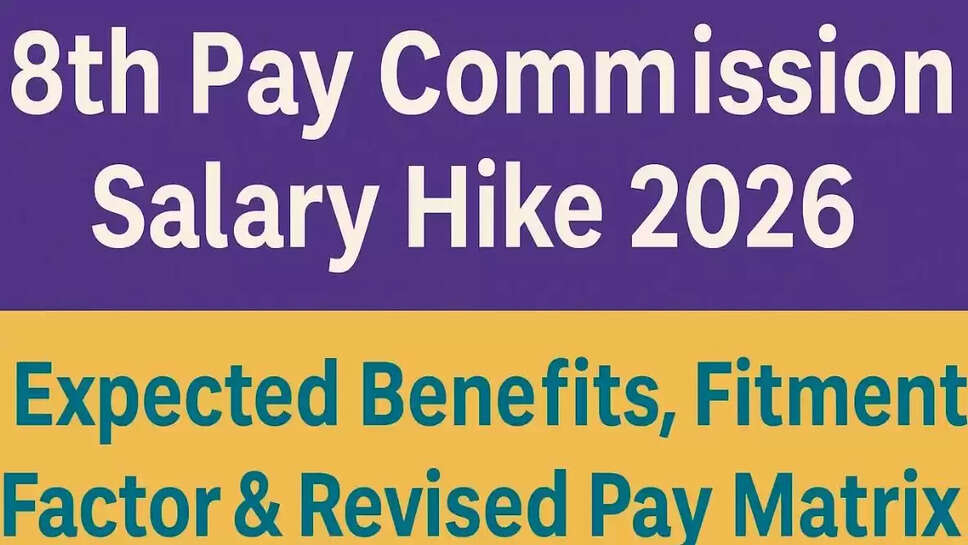1 crore employees will get good news soon! Big update on 8th Pay Commission 8th Pay Commission Salary Hike Update
8th Pay Commission Salary Hike News – If you are also in a government job or are dependent on pension after retirement, then the news of the 8th Pay Commission is no less than a gift for you. Recently, the central government has given the green signal to this much-awaited pay commission. It will have a direct impact on about 50 lakh central employees and 65 lakh pensioners. Now the question is when will it be implemented, how much will the salary increase and who will be affected by it? Let's understand in detail.

When can the 8th Pay Commission be implemented?
The government may not have made its recommendations public yet, but if media reports and employee unions are to be believed, the new salary structure can be implemented from January 1, 2026. However, the process of preparing the commission's report, discussing it and implementing it may take time. Usually, it takes 18 to 20 months for any pay commission to be implemented.
Why are employees excited?
For a long time, employee organizations were demanding that the 8th Pay Commission be formed, because inflation is constantly increasing but the salary has not increased in the same proportion. Now that the government has approved it, it is natural that there is a wave of happiness among employees and pensioners. Everyone's eyes are now fixed on what will be the fitment factor and how much the allowances will be increased.
What is the fitment factor?
The fitment factor is a coefficient by which the new salary is decided by multiplying the existing basic salary. In the 7th Pay Commission, this factor was 2.57. In the 8th Pay Commission, it is expected to be between 2.65 to 2.86. However, the employee union demands that it be increased to 3.68 so that there is a strong increase in the salary.
For example, if the basic salary of an employee is Rs 20,000 and the fitment factor is fixed at 2.86, then his new basic salary will be around Rs 57,200. Apart from this, DA, HRA and other allowances will also be added.
Dearness allowance will also be merged
A special thing in every pay commission is that the dearness allowance (DA) before its implementation is merged in the basic salary. Currently, the DA of central employees has crossed 50%. In such a situation, when the 8th Pay Commission will be implemented, this DA will be directly added to the basic salary and the calculation of the new DA will start again from 0.
Which allowances can change?
HRA (House Rent Allowance): House rent is continuously increasing in big cities. In such a situation, an increase of more than 20% is expected in HRA.
Transport Allowance: In view of the rising prices of petrol and diesel, an increase is also possible in this.
Children Education Allowance: This allowance can also be updated in view of the expenses of children's education.
How much will pensioners benefit?
This commission will also bring relief to pensioners. Pension calculation is based on basic salary, and if the basic increases then the pension will also increase. Apart from this, DR (Dearness Relief) will also be adjusted according to the new framework. This will give more benefits to elderly pensioners.
State governments will be affected
Although this pay commission is for the central government, most of the state governments of the country also adopt it. This will affect more than 1 crore employees and pensioners. This will definitely be a challenge for the state governments as they will have to make provision for these increased salaries and pensions in their budget.
What can be the delay in implementation?
Although the government has approved it, but the formation of the commission, appointment of members, suggestions, preparation of reports and getting approval from the cabinet - all this is a long process. If all these steps are completed on time, it is likely to be implemented from January 2026. But there may be a delay of 2-4 months.
Demands of employee unions
Apart from the Pay Commission, many employee organizations are also demanding the abolition of the New Pension Scheme (NPS) and the implementation of the Old Pension Scheme (OPS). Along with this, the demand is also being raised to implement the recommendations of the Pay Commission on time and to make the minimum wage Rs 26,000 per month.
The 8th Pay Commission has brought new hope for government employees and pensioners. Even though its implementation is still some time away, its announcement itself has created an atmosphere of relief financially. It will be interesting to see in the coming months what recommendations the government accepts and which benefits actually reach the employees.
